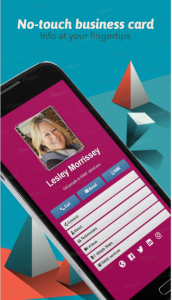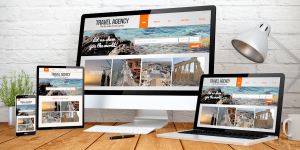
Whether you’re just starting your business or trying to grow the business you’ve got, there are a few things that are essential. These are just a handful of business tools that will make your business stand head and shoulders above your competitors.
1: A mobile business card
 A good one of these is great, but pick your card carefully. Some of them are cheap and cheerful, some give you tons of facilities and some are pretty basic. Having looked at several I finally settled on this one. It offers an attractive look and feel, is easy to use and you can have as much information on it as you want, from written date to images and even video content. You can promote your events, your products, your services, your affiliate links, whatever you want – it’s like a mini-website.
A good one of these is great, but pick your card carefully. Some of them are cheap and cheerful, some give you tons of facilities and some are pretty basic. Having looked at several I finally settled on this one. It offers an attractive look and feel, is easy to use and you can have as much information on it as you want, from written date to images and even video content. You can promote your events, your products, your services, your affiliate links, whatever you want – it’s like a mini-website.
You literally get people to scan the code and it appears on their phone ‘desktop’. If you’re worried about having lots of them showing up on your screen, it’s easy to keep them all in a folder.
It means you can give people far more than just your contact details – it’s a whole marketing vehicle. Check out more here.
2: A payment system
 If you want to make regular payments easy, you don’t want to be raising invoices each month, then chasing after people who don’t pay on time. GoCardless is an ideal tool for retained clients, subscriptions and anyone who pays a regular monthly fee.
If you want to make regular payments easy, you don’t want to be raising invoices each month, then chasing after people who don’t pay on time. GoCardless is an ideal tool for retained clients, subscriptions and anyone who pays a regular monthly fee.
It means that you can be sure that your money lands in your bank account reliably month-in, month out. And best of all, if anyone doesn’t pay, GoCardless will do the chasing – until they do – even if that means ‘going legal’. They do all the leg and legal work for you at no extra cost. All you pay is a small percentage (as little as 1%) of each invoice – definitely worth it, compared to your time, when you could be doing the things that earn you much more.
For one-off payments you’ll probably find a shopping cart such as Stripe is more effective. It will process payments for events, products and online programmes in a simple streamlined process.
3: A website
 Even if you’re a very small business, a website is no longer a ‘nice-to-have’. If people go online to check you out and you don’t have a presence, they won’t take you seriously.
Even if you’re a very small business, a website is no longer a ‘nice-to-have’. If people go online to check you out and you don’t have a presence, they won’t take you seriously.
A good website doesn’t have to be huge, or have lots of bells and whistles, but it does have to represent you well. That means:
- A modern design
- An easy-to-see way to contact you on every page
- A powerful message that engages the visitor
- Clear navigation that doesn’t require thinking to understand
- Images that represent your business well (and load quickly)
- Properly secured against hackers (if you can type your web address followed by ‘wp-admin’ or ‘wp-login’ and get to the log in page, your site isn’t secure! And if it does get hacked you should be able to get it back online in minutes – not days.)
- Pinged out so it’s found by search tools quickly.
4: A web app
 This isn’t the same as a phone app, even though it can be used on a phone. Instead of downloading an app onto your phone, you can access the web app using your phone to go online. It’s seamless and looks pretty much the same as a phone app.
This isn’t the same as a phone app, even though it can be used on a phone. Instead of downloading an app onto your phone, you can access the web app using your phone to go online. It’s seamless and looks pretty much the same as a phone app.
What can it do?
- Provide your menu online for diners at restaurants so there’s a contact-free means of ordering their meal.
- Provide details of the latest cars on offer for car showrooms and second hand car dealers.
- Show all the latest properties available to let for landlords or letting agents or properties currently for sale for estate agents.
- Show all the products available for MLM team members to show off to their customers
- Provide ongoing health and fitness information for personal trainers, weight control specialists and fitness/nutrition industry experts.
Imagine if your clients – and potential clients – had everything at their fingertips, just by having your web app on their phone? Find out more here.
5: Video material
 We’re in a world where video content is the only way to be seen. Look on social media – Facebook, LinkedIn, Instagram, TikTok – it’s all video material that takes precedence. To get noticed you need video.
We’re in a world where video content is the only way to be seen. Look on social media – Facebook, LinkedIn, Instagram, TikTok – it’s all video material that takes precedence. To get noticed you need video.
It depends on which platform you’re making your video for, as to what the ideal length is. YouTube like it to be at least 8-12 minutes, but Facebook like short videos 30-60 seconds and Instagram likes them even shorter – 15 seconds. LinkedIn members will watch a couple of minutes, more if it’s really interesting and relevant.
Getting lots of views on social media depends on content that is:
- Entertaining
- Informative
- Interesting
However, there’s a big difference between videos that turn up in your feed because a friend has shared it (think cat videos) and a video you’ve actively chosen to watch. If you want video content to show up on the first search page on YouTube (and people do use it like a search engine), it will need to be highly optimised so it shows up when people search on your keywords.
If you want to know more about this, give me a call on 01245 473296.
